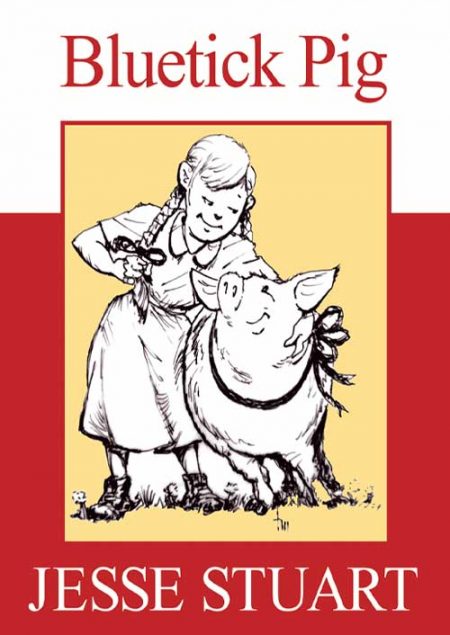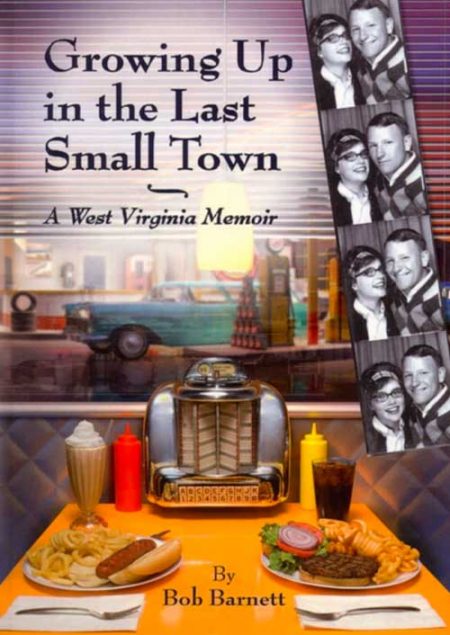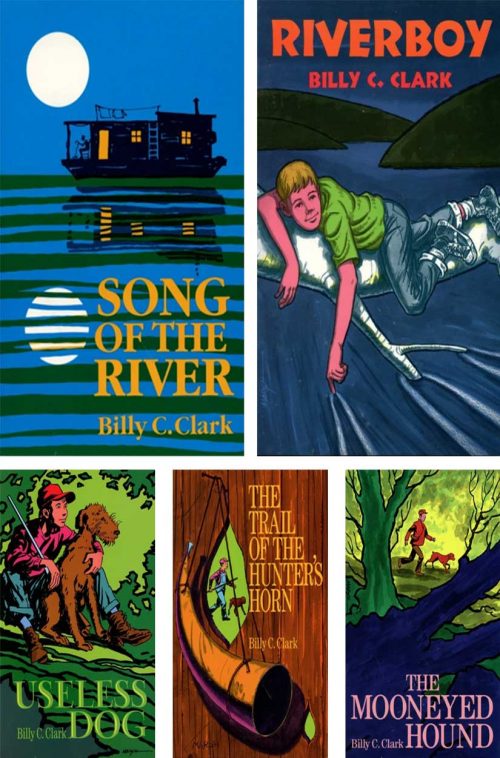-
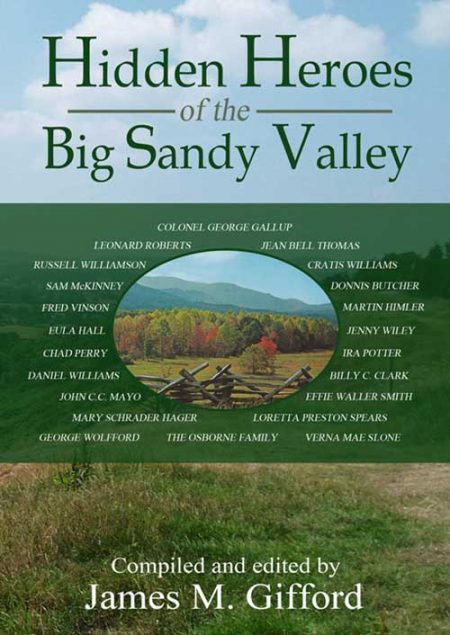 The Big Sandy Valley — sometimes called Kentucky's last frontier — has been shaped by a series of extraordinary individuals and families over the course of the past 200 years. Hidden Heroes of the Big Sandy Valley profiles and celebrates an exclusive group of these people. The book contains 22 biographical essays and one cultural essay by 17 authors. The people who are profiled in this book are true representatives of millions of people who have populated the Big Sandy Valley for more than two hundred years. HARDBACK Compiled and edited by James M. Gifford
The Big Sandy Valley — sometimes called Kentucky's last frontier — has been shaped by a series of extraordinary individuals and families over the course of the past 200 years. Hidden Heroes of the Big Sandy Valley profiles and celebrates an exclusive group of these people. The book contains 22 biographical essays and one cultural essay by 17 authors. The people who are profiled in this book are true representatives of millions of people who have populated the Big Sandy Valley for more than two hundred years. HARDBACK Compiled and edited by James M. Gifford -
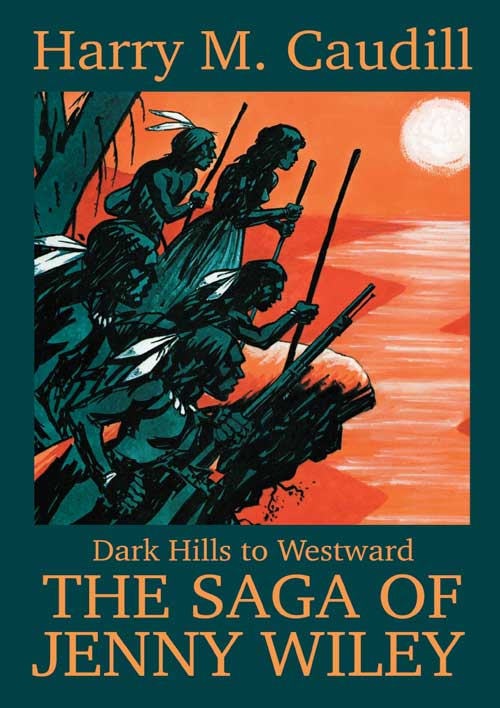 Best known for his nonfiction work "Night Comes to the Cumberlands," Harry M. Caudill also wrote fiction, including “Dark Hills to Westward: The Saga of Jenny Wiley,” first published in 1969 and recently reprinted in a new softback edition by the Jesse Stuart Foundation. When Jenny was an old woman, a preacher had sat down with her and wrote out her captivity story. Although Jenny may have embellished it many times, it is the only first-hand account we have, and it’s the primary source for Caudill’s novel. Briefly, here is her story. Thomas and Jenny Wiley had pioneered land on Walker’s Creek in Bland County, Virginia. On October 1, 1789, while Thomas was away, a small band of Indians, seeking revenge for a recent defeat at the hands of white settlers, attacked the Wiley cabin and killed and scalped Jenny’s three older children and her brother. Jenny, seven months pregnant, was taken captive along with her baby son, Adam. SOFTBACK VERSION By Harry M. Caudill
Best known for his nonfiction work "Night Comes to the Cumberlands," Harry M. Caudill also wrote fiction, including “Dark Hills to Westward: The Saga of Jenny Wiley,” first published in 1969 and recently reprinted in a new softback edition by the Jesse Stuart Foundation. When Jenny was an old woman, a preacher had sat down with her and wrote out her captivity story. Although Jenny may have embellished it many times, it is the only first-hand account we have, and it’s the primary source for Caudill’s novel. Briefly, here is her story. Thomas and Jenny Wiley had pioneered land on Walker’s Creek in Bland County, Virginia. On October 1, 1789, while Thomas was away, a small band of Indians, seeking revenge for a recent defeat at the hands of white settlers, attacked the Wiley cabin and killed and scalped Jenny’s three older children and her brother. Jenny, seven months pregnant, was taken captive along with her baby son, Adam. SOFTBACK VERSION By Harry M. Caudill -
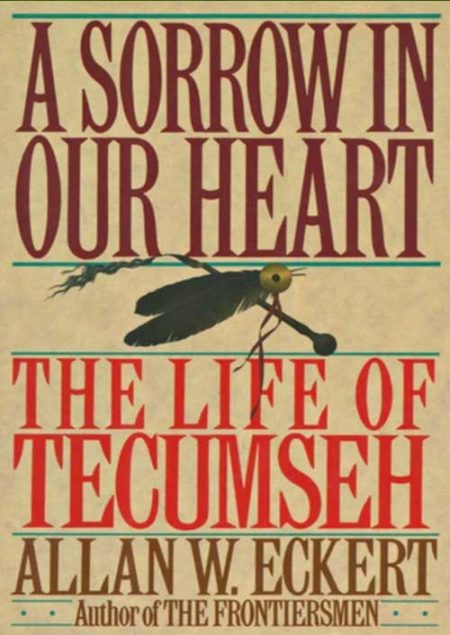 Though there are many biographies of the great Shawnee chief Tecumseh (1768-1813), this effort by historical novelist Allan W. Eckert may spark new interest — and controversy — with its "hidden dialogue" technique. After more than 25 years of research, the author felt free to recreate Tecumseh's conversations and thoughts in what proves to be an entertaining blend of fact and fiction. The orator and organizer's life was shaped by his tribe's tragic confrontation with westward-moving whites, who encroached on Native American lands along the Ohio River valley. His long struggle against this dispossession led Tecumseh to create a historic confederacy of tribes, but this crowning achievement was destroyed by his own brother at Tippecanoe in 1811. SOFTCOVER By Allan Eckert
Though there are many biographies of the great Shawnee chief Tecumseh (1768-1813), this effort by historical novelist Allan W. Eckert may spark new interest — and controversy — with its "hidden dialogue" technique. After more than 25 years of research, the author felt free to recreate Tecumseh's conversations and thoughts in what proves to be an entertaining blend of fact and fiction. The orator and organizer's life was shaped by his tribe's tragic confrontation with westward-moving whites, who encroached on Native American lands along the Ohio River valley. His long struggle against this dispossession led Tecumseh to create a historic confederacy of tribes, but this crowning achievement was destroyed by his own brother at Tippecanoe in 1811. SOFTCOVER By Allan Eckert -
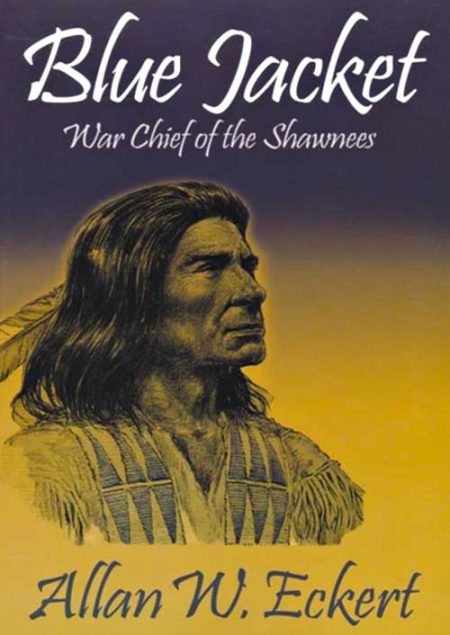 In the year 1771, a white boy named Marmaduke Van Swearingen was captured by the Shawnee Indians in what is now West Virginia, but was then the edge of the American frontier. Impressed with his bravery, he was not killed but instead was taken to Ohio where he was adopted into the tribe and given the name Blue Jacket, from the blue shirt he was wearing at the time of his capture. Eckert has taken all of the known facts of Blue Jacket's life and has woven them into a narrative of compelling interest, with a very different perspective on the way America was settled. The reader will learn what life was really like on the dangerous frontier wilderness that was West Virginia, Kentucky and Ohio before the Revolutionary War. By Allan Eckert
In the year 1771, a white boy named Marmaduke Van Swearingen was captured by the Shawnee Indians in what is now West Virginia, but was then the edge of the American frontier. Impressed with his bravery, he was not killed but instead was taken to Ohio where he was adopted into the tribe and given the name Blue Jacket, from the blue shirt he was wearing at the time of his capture. Eckert has taken all of the known facts of Blue Jacket's life and has woven them into a narrative of compelling interest, with a very different perspective on the way America was settled. The reader will learn what life was really like on the dangerous frontier wilderness that was West Virginia, Kentucky and Ohio before the Revolutionary War. By Allan Eckert -
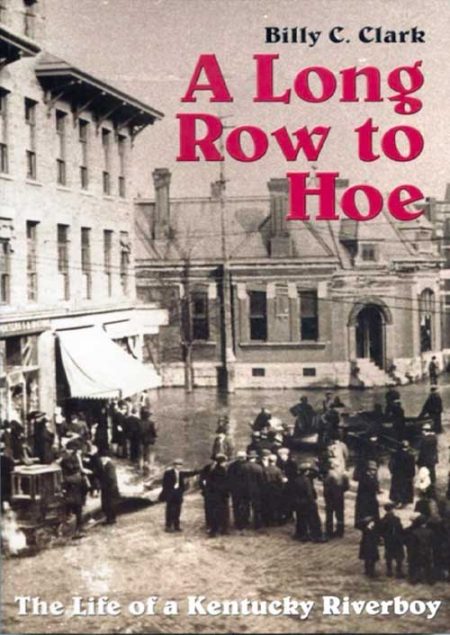 Boston University, the site of the world’s finest repository of 20th Century literature, praises Billy C. Clark as “one of the South’s most distinguished writers.” In this fascinating and highly readable book, Clark, founder and editor of Virginia Writing, writes of his own astonishingly primitive childhood in an Appalachian river town, Catlettsburg, Kentucky, at the junction of the Big Sandy and the Ohio Rivers. Billy C. Clark was a member of a sprawling, ragged family. His father was an intelligent, fiddle-playing shoemaker with little formal education. His mother often took in washing to help provide food for the family. Billy grew up in a derelict house, “The Leaning Tower,” on the banks of the Ohio. Always hungry, often dirty, and without sufficient clothing, he led an adventurous life on the two rivers, swimming, fishing, and salvaging flotsam from the frequent floods. He set trout lines for fish and trap lines for mink and muskrats, and he walked fourteen miles before school to clear his traps. He learned laughter from his magnificent mother and wisdom from his father, who taught him that “poor folks have a long row to hoe….” Billy was the only one of his family to seek an education, and through his traps, his river salvage, and odd jobs, he earned money to put himself through school. The book ends with a powerful account of his parents’ pride at his graduation. Time Magazine said that this book is “as authentically American as Huckleberry Finn.” It is a touching account of a boy and two rivers. It is a must for public and school libraries, or anyone interested in Appalachian history or literature. By Billy C. Clark
Boston University, the site of the world’s finest repository of 20th Century literature, praises Billy C. Clark as “one of the South’s most distinguished writers.” In this fascinating and highly readable book, Clark, founder and editor of Virginia Writing, writes of his own astonishingly primitive childhood in an Appalachian river town, Catlettsburg, Kentucky, at the junction of the Big Sandy and the Ohio Rivers. Billy C. Clark was a member of a sprawling, ragged family. His father was an intelligent, fiddle-playing shoemaker with little formal education. His mother often took in washing to help provide food for the family. Billy grew up in a derelict house, “The Leaning Tower,” on the banks of the Ohio. Always hungry, often dirty, and without sufficient clothing, he led an adventurous life on the two rivers, swimming, fishing, and salvaging flotsam from the frequent floods. He set trout lines for fish and trap lines for mink and muskrats, and he walked fourteen miles before school to clear his traps. He learned laughter from his magnificent mother and wisdom from his father, who taught him that “poor folks have a long row to hoe….” Billy was the only one of his family to seek an education, and through his traps, his river salvage, and odd jobs, he earned money to put himself through school. The book ends with a powerful account of his parents’ pride at his graduation. Time Magazine said that this book is “as authentically American as Huckleberry Finn.” It is a touching account of a boy and two rivers. It is a must for public and school libraries, or anyone interested in Appalachian history or literature. By Billy C. Clark -
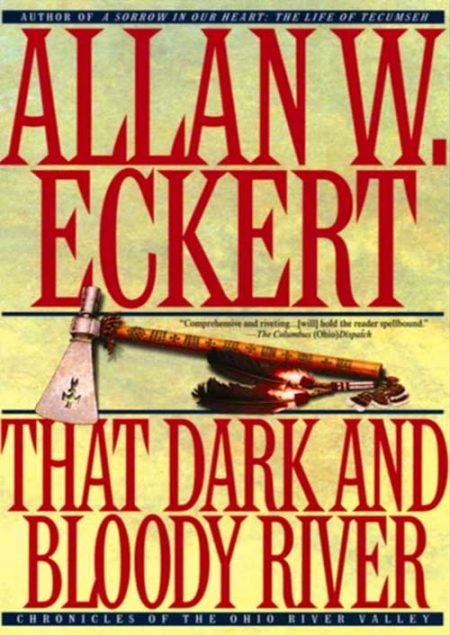 The Ohio River, a principal route for pioneers pushing westward along its 981-mile course from Pennsylvania through Kentucky and Indiana to Illinois, was the scene of fierce battles among warring Indian tribes, Shawnee, Miami, Cherokee, Iroquois, etc., and between Native Americans and white settlers. Tapping journals, letters, diaries and government memoranda from 1768 to 1799, and fleshing out his panoramic chronicle with reconstructed dialogue adapted from primary sources, historian-novelist Eckert has fashioned an epic narrative history of the struggle for dominance of the Ohio River Valley that makes compelling reading. The lives of notable pioneer families (Zanes, Bradys, Wetzels), incursions of traders, explorers, colonists, adventurers and the historic exploits of George Washington, Daniel Boone, George Rogers Clark and others intersect. SOFTBACK By Allan Eckert
The Ohio River, a principal route for pioneers pushing westward along its 981-mile course from Pennsylvania through Kentucky and Indiana to Illinois, was the scene of fierce battles among warring Indian tribes, Shawnee, Miami, Cherokee, Iroquois, etc., and between Native Americans and white settlers. Tapping journals, letters, diaries and government memoranda from 1768 to 1799, and fleshing out his panoramic chronicle with reconstructed dialogue adapted from primary sources, historian-novelist Eckert has fashioned an epic narrative history of the struggle for dominance of the Ohio River Valley that makes compelling reading. The lives of notable pioneer families (Zanes, Bradys, Wetzels), incursions of traders, explorers, colonists, adventurers and the historic exploits of George Washington, Daniel Boone, George Rogers Clark and others intersect. SOFTBACK By Allan Eckert -
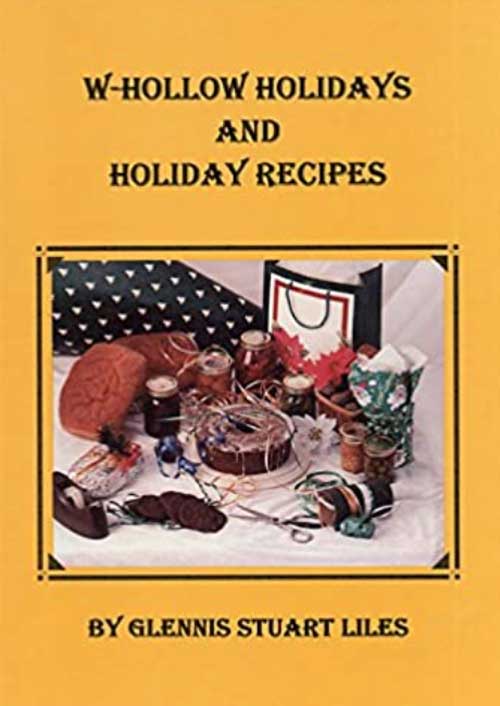 In her Introduction, Glennis Stuart Liles provides some historical background on Greenup and Greenup County and then she focuses on her parents and her family in “W-Hollow Holidays and Holiday Recipes." “My parents, Martha and Mitchell Stuart, married at Plum Grove (Greenup County) and went to house keeping in W-Hollow just over the hill from the town of Greenup. They lived there until they died in the early fifties. They, and their neighbors, grew their vegetables on the rocky hillsides, milked cows, and killed their own meat. Everyone was poor, but they did their best to make holidays special. The most important part of each holiday was the food. It was served in the dining room, on a fancy tablecloth with cloth napkins and their best silverware and china. The recipes in this book are special to the people of W-Hollow. They have been used over and over on special occasions – some for more than one-hundred-fifty years.” HARDBACK VERSION By Glennis Stuart Liles
In her Introduction, Glennis Stuart Liles provides some historical background on Greenup and Greenup County and then she focuses on her parents and her family in “W-Hollow Holidays and Holiday Recipes." “My parents, Martha and Mitchell Stuart, married at Plum Grove (Greenup County) and went to house keeping in W-Hollow just over the hill from the town of Greenup. They lived there until they died in the early fifties. They, and their neighbors, grew their vegetables on the rocky hillsides, milked cows, and killed their own meat. Everyone was poor, but they did their best to make holidays special. The most important part of each holiday was the food. It was served in the dining room, on a fancy tablecloth with cloth napkins and their best silverware and china. The recipes in this book are special to the people of W-Hollow. They have been used over and over on special occasions – some for more than one-hundred-fifty years.” HARDBACK VERSION By Glennis Stuart Liles -
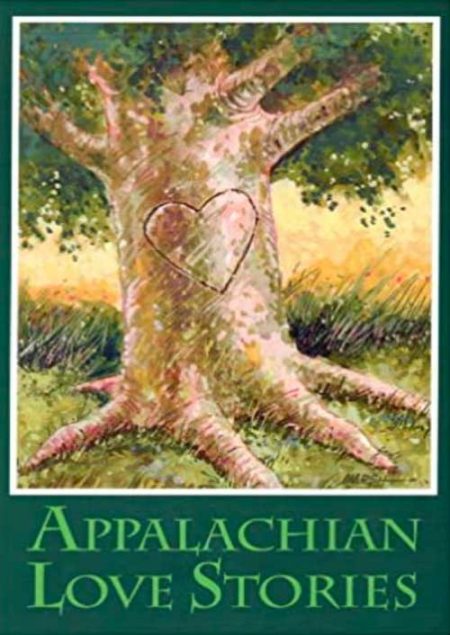 Authors represented in Appalachian Love Stories include:
Authors represented in Appalachian Love Stories include:- Jesse Stuart
- Ancella R. Bickley
- James M. Gifford
- Jimmy Lowe
- James B. Goode
- Edwina Pendarvis
- Laura Treacy Bentley
- Bruce Radford Richey
- Ina Everman
- Danny Fulks
- Loyal Jones
- Billy C. Clark
- Linda Scott DeRosier
- Christina St. Clair
- Alexandra Combs Hudson
- Kate Larken
- Barbara Smith
- Carol Van Meter
-
Out of stock
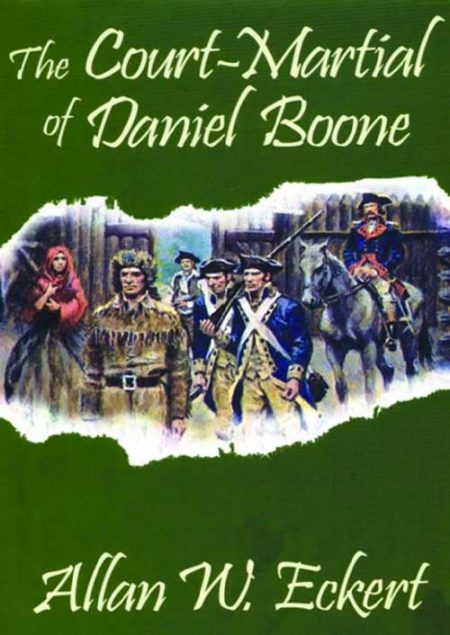 This young adult historical novel is based on an exciting and little known incident in the life of the famed Kentucky frontiersman Daniel Boone when, after being captured by Shawnee Indians and subsequently adopted into their tribe, he then escapes and returns to Boonesboro, only to find himself charged with treason and court-martialed. In a brilliant display of ability, Boone defends himself at the trial and gradually the truth about what really happened emerges. A fascinating glimpse of Kentucky's pioneer period as well as a penetrating look at frontier courtroom justice. By Allan Eckert
This young adult historical novel is based on an exciting and little known incident in the life of the famed Kentucky frontiersman Daniel Boone when, after being captured by Shawnee Indians and subsequently adopted into their tribe, he then escapes and returns to Boonesboro, only to find himself charged with treason and court-martialed. In a brilliant display of ability, Boone defends himself at the trial and gradually the truth about what really happened emerges. A fascinating glimpse of Kentucky's pioneer period as well as a penetrating look at frontier courtroom justice. By Allan Eckert


